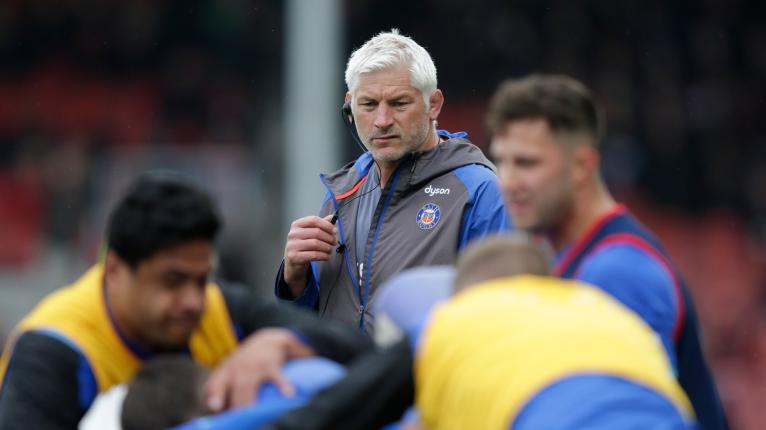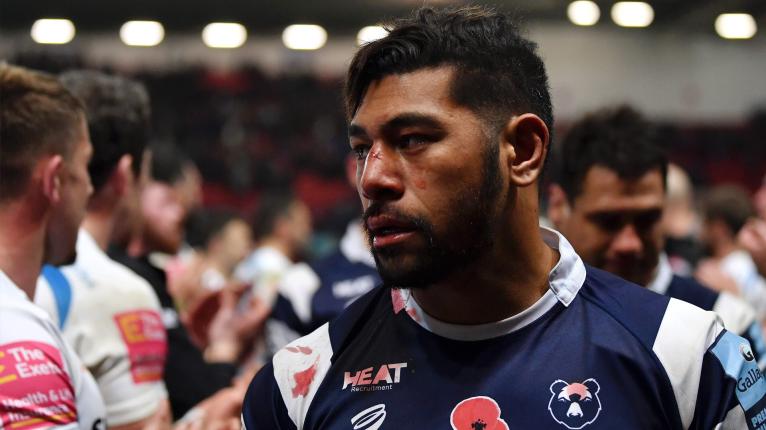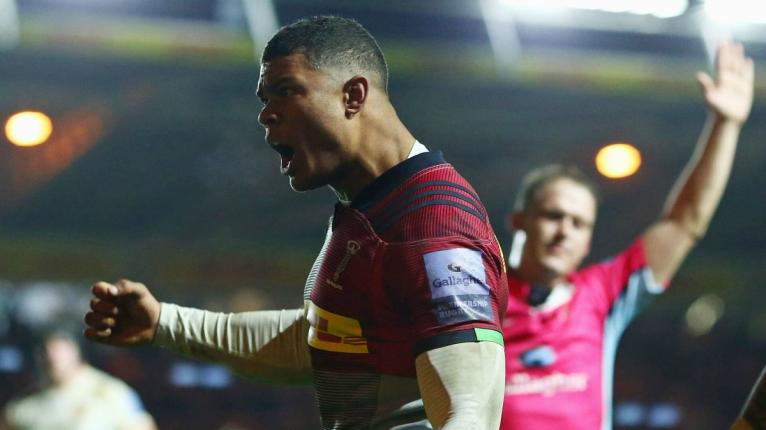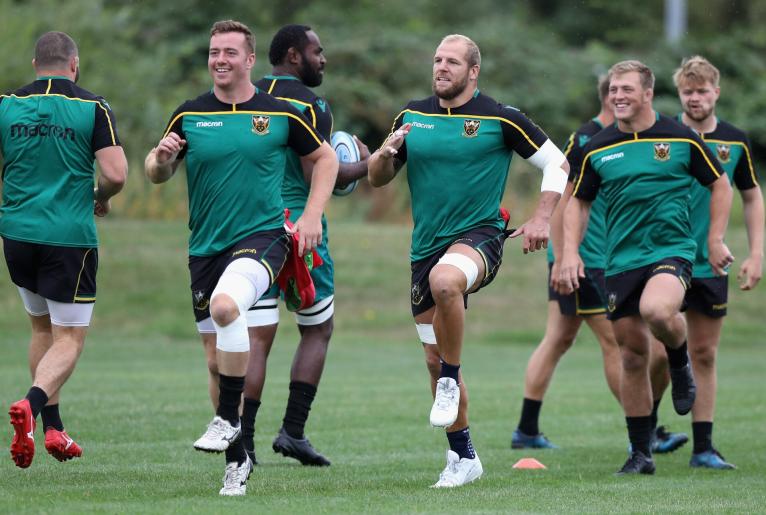Santa Claus looks slightly different up and down the Gallagher Premiership this year.
Gone is the fleece-lined red getup, big black boots, unkempt beard and the crumbs of mince pies, and in their place a sharp double-breasted Hugo Boss number, Gucci loafers, some designer stubble and a non-soy, half fat, decaf, vanilla double shot Frappuccino.
Good old St Nick has been replaced by investment bankers.
The Premiership’s partnership with CVC Capital Partners has now been confirmed and set to take place early in 2019, with the private equity firm reportedly taking a 27% stake in the competition for a payment of over £200m. If those reported figures are accurate, each of the 13 stakeholders in the Premiership should be set to receive over £15m apiece.
So, with Santa’s sleigh laden down with briefcases full of cash, what could Premiership directors of rugby be asking for this Christmas and where could that money be spent?

Bath
This won’t exactly be on Todd Blackadder’s personal Christmas list, but Bath’s Christmas list is surely asking for a new head coach. The off-field structure at the club is about to significantly change with Stuart Hooper set to become Director of Rugby and Andy Rock to become Performance Director, with the gaping hole left to fill being that of the head coach.
Given the way Bath are structured off the field and the fact they have a very hands-on owner in Bruce Craig, means that they need a head coach who can really coach. They will need someone who can take the players at their disposal and improve them, because there is no guarantee how much say they will have over player recruitment and retention. You would be hard-pressed to find a better candidate than Stuart Lancaster, who has thrived in that sort of a role with Leinster and the IRFU.
The stadium plans seem to finally be moving forward irrespective of the investment from CVC, so finding a coach to mould what Bath will hope is the beginning of a new golden era for the club seems to be top of the wish list.
Bristol Bears
What do you buy the person that has everything? Of course, Bristol don’t literally have everything, but with the wealthy Stephen Lansdown funding the club, this investment from CVC is not quite the game-changer it could prove to be at other clubs.
Nevertheless, a sizeable portion of Bristol’s share could be allocated towards a new training ground. Back in 2016, the club applied for planning permission to build a facility in the Failand region of Bristol, very close to Bristol City’s current training ground, with the football club also owned by Lansdown.
As stands, Bristol train at Clifton RFC and whilst it does the job for the Premiership side, it is not quite of the same calibre of facility that some of the other clubs in the league enjoy. A brand-new facility with all the bells and whistles is only going to further encourage players to sign with the club, as they seek to consolidate their place in the Premiership and build a side capable of challenging for the title.

Exeter Chiefs
Financially, Exeter have been ticking along nicely due to healthy attendances and the use of Sandy Park for non-rugby events. That said, Sandy Park only currently holds 12,800.
The club put in place a long-term vision in 2012 of expanding the stadium to around the 20,000 mark by 2020 and whilst that seems unlikely to come to fruition in the next 12 months, expansion must be at the forefront of Exeter’s minds, as well as further development to their conference facilities. Those conference facilities were enough for the club to make a profit in the previous fiscal year and are vital in an age where the costs of rugby outstrip the income the sport can provide.
Exeter have sold out their home game with Saracens this weekend and it will not be the last time this season that demand outstrips supply in Devon. With the Cornish Pirates on an upward trajectory, Exeter might want to get a few more prospective fans in through the door before the competition begins to heat up in the south-west.
Continue reading below…
Watch: Beyond 80 – Knocked.
Gloucester
It’s hard to put your finger on what exactly Gloucester need right now. Their fortunes on the pitch are improving, they have a coaching staff that is clearly having success, the training facilities are of a high standard and they already boast one of the larger stadium capacities in the competition.
That said, the increased costs of running the club outstripped the increases in revenue in the last fiscal year, so finding a way to bring that revenue up is paramount. One way in which they could try to do that is by increasing the hospitality and commercial facilities at Kingsholm. As a stadium, it is known for its passionate – sometimes too passionate – atmosphere, but not its ability to entertain corporate clients.
It is regularly used in the summer as a venue for music gigs and again, increases and improvements in these facilities should help to cater to that and make it an even more profitable venture.
Harlequins
The Guildford-based side could do worse than reach out to the University of Surrey and try to form a partnership similar to the one that Ealing Trailfinders have forged with Brunel University. Having a BUCS Super Rugby university on your doorstep is now a fantastic tool for recruiting talented young players, as well as helping your senior academy products develop whilst they study. Exeter Chiefs, Bath, Newcastle Falcons and Leicester Tigers are all examples of clubs able to utilise this advantage.

Even Saracens seem to have a productive relationship with Loughborough University and manage to achieve many of the same benefits, despite not being geographically particularly close to the university. If Harlequins helped the University of Surrey rise through the ranks and take a spot in BUCS Super Rugby, the advantages to the club would be many. It would also be a good additional pathway for a club that has a particularly healthy recruiting ground at the junior academy level, with the club unable to develop and contract all the talented players within their region.
The Stoop also regularly sells out and is another candidate for expansion, although plans were lodged in 2017 to completely rebuild the stadium, with a 25,000 capacity, multi-sport facilities and an accompanying hotel, which was slated at a £50m cost. That £15m investment would take a fair chunk out of that.
Leicester Tigers
The club’s much talked about plan to build a hotel adjacent to Welford Road is an exciting one, but it doesn’t come cheap. The projected costs of the project sit at around £22m, so if a large part of that CVC investment were allocated towards that, it would make Leicester’s books a little easier to balance moving forward.
The reality of club rugby today is that the income the sport generates is not enough to support the costs of running it, so clubs need to diversify and find additional revenue streams. It’s worked well for Exeter and could do likewise for Leicester, who are much closer to sustainability than a number of other clubs.
Featuring a restaurant, ‘sky bar’, retail area, fitness suite and business centre, the hotel should bring in a significant revenue stream once completed, not to mention making the matchday experience an improved one at Leicester, particularly for travelling fans.
Newcastle Falcons
Falcons unveiled plans last season to expand Kingston Park, with an extension to the north stand that would provide covered seats and a hospitality suite, taking Kingston Park from a capacity of 10,200 to 11,730.
Newcastle sold out Kingston Park on multiple occasions in the 2017/18 season and attracted over 30,000 to St James’ Park for their match against Northampton Saints, so expanding the stadium is the logical next step for a club that struggles to generate the higher revenues of the southern and Midlands-based Premiership clubs.
You couldn’t begrudge Falcons spending a bit of it on their squad, either. Whilst not a move you want to see the majority of clubs make, due to the increases in wage demands it will only serve to exacerbate, the side from the north-east could be given a welcome shot in the arm in terms of their recruitment for the coming seasons.
Northampton Saints
Like Leicester, Northampton aren’t too far from sustainability and yet, their losses in the last fiscal year increased, as the rise in turnover was significantly smaller than the rise in their costs. One-off payments that included changes in coaching and commercial staff account for some of this, but not the whole of the deficit.
Similar to Gloucester, they are in pretty good shape across the board in terms of infrastructure but need to find ways of creating additional revenue streams. As fortunes have waned on the field, attendances have dipped slightly, so immediate expansion is probably unnecessary.

If Franklin’s Gardens can be upgraded to help them accommodate more non-rugby events, such as the stadium’s hosting of a Lionel Richie concert back in the summer, that will help balance the books. Unfortunately, space is at a premium in the immediate area surrounding the stadium, so plans like the ones Leicester have for a hotel, or the conference facilities Exeter and Wasps both boast, would be harder to realise for Saints.
Sale Sharks
The biggest issue facing Sale off the field is the size of their fanbase. They have been averaging attendances in the range of 6,000-7,000 for the last few years and their current average in the Premiership for the 2018/19 season is 6,090, which is the lowest mark since they moved to the AJ Bell Stadium. With Newcastle’s upturn in support, Sale have the lowest attendances in the league.
With the club signing a 25-year lease at the stadium, it looks unlikely that a move is on the cards, so engaging with the local area as much as possible will be key to getting more fans through the turnstiles. Increased participation programmes in local schools and universities, free and discounted tickets, hiring more community staff and anything else which will help get prospective fans in the stadium and on the path to becoming fully-fledged fans.
Like Newcastle, they are another side where a portion perhaps should be set aside for recruitment, given both Sale’s smaller squad size and their haemorrhaging of players in previous seasons. It won’t help the club move towards sustainability in the short-term, but improved fortunes on the pitch should help bring fans through the door and create a more prosperous future.
Continue reading below…
Watch: Exceptional Stories: Henry Fraser.
Saracens
Having sourced funding for the £23m redevelopment of the west stand at Allianz Park and boasting an excellent training facility at Old Albanians, Saracens are moving in a positive direction off the field. That said, the stand redevelopment is not going to dramatically increase the capacity at Allianz Park and the club are already regularly selling out the stadium.
Surrounded by a golf course, golf centre, two rugby clubs, a leisure centre, a karate dojo and five-a-side football pitches, there are possibly opportunities for Saracens to invest in and/or acquire some of these facilities, creating a sporting village in the Barnet region under the umbrella of their ownership, in an attempt to increase their revenues.
One other thing that could be on Saracens’ wishlist and made possible by the CVC investment would be an investment in their Developing Player Programme (DPP). With Saracens’ academy recruiting ground spanning Kent, Hertfordshire and a large part of Essex, they account for close to five million people, before even considering their reach within Greater London. With the geographic distance and scope of numbers, having another training base in Kent, or an AASE programme based in the county, would help ensure players do not slip through the cracks.
Wasps
Probably not much more to say here other than to start paying off that £35m bond scheme. The club confirmed in 2017 that it may need to refinance the scheme, as they were not generating enough revenue to pay it off. This investment should give the club some breathing room, but it’s not a pretty situation in Coventry.
The club are going ahead with their plans for a new training ground at Old Leamingtonians RFC, having spent the last four years at a temporary base at Broadstreet RFC. The training ground situation has been a reported source of discontent at the club and was one of the reasons cited for the club launching the bond scheme back in 2015.
Between those two projects, there is unlikely to be any money left over for anything else.
Worcester Warriors
A lot of unknowns, here, with Worcester under new ownership and not a whole lot known, just yet, on what path they want the club to take. Worcester recorded a pre-tax loss of £8.1m in the 2016/17 season and there is clearly a sizeable deficit between revenue and costs in the West Midlands.
Smaller attendances don’t help, with only Newcastle and Sale bringing less people through the turnstiles, but their costs are currently too high for a club of their means. In that fiscal year ending in 2017, they were the only Premiership club whose wage bill outstripped that of their turnover, and that, obviously, was before even accounting for their loans and other costs.
The question is, how does the £15m-plus investment from CVC help change that? Like Sale, attempts to increase attendances could be key, but ultimately, the club needs to be more effectively run at the boardroom level, something the new owners will hopefully bring, and the investment can be used to eradicate some of the club’s debt, therefore helping them operate on slightly more of an even footing moving forward.
Watch: Exceptional Stories: Ian McKinley.


































